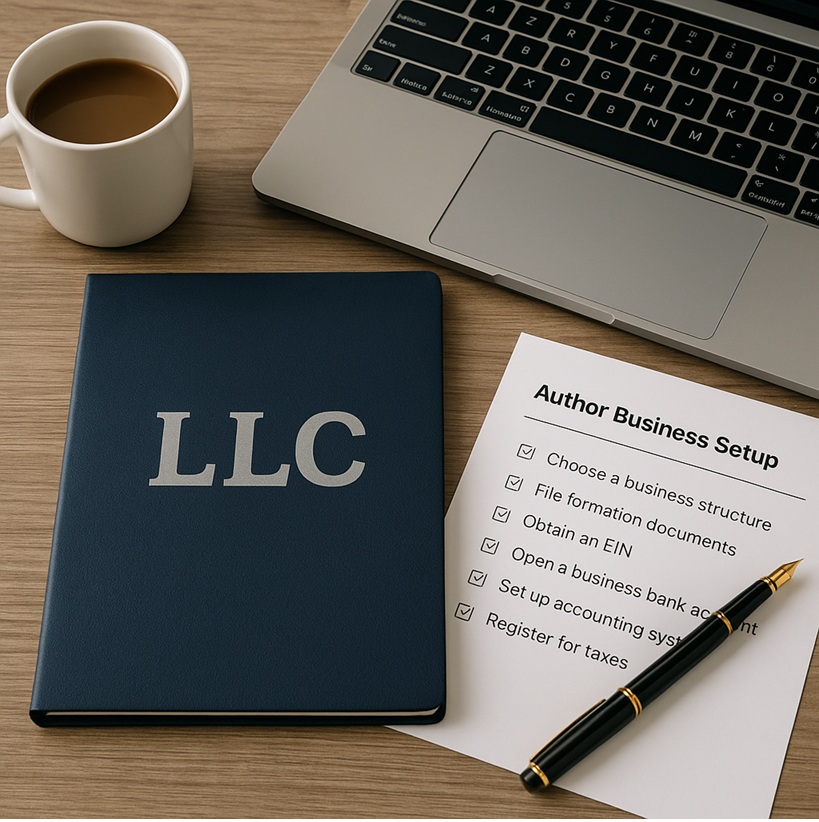Forming an LLC? What New Indie Authors Need to Know
“To succeed in business, to reach the top, an individual must know all it is possible to know about that business.” — J. Paul Getty
Is It Time to Level Up Your Author Business?
Publishing your own book makes you an author. Choosing to run it like a business makes you an entrepreneur. As you grow, the question arises. What about forming an LLC? Understanding these business structures can empower you to make informed decisions about your writing career.
Forming an LLC, a Limited Liability Company, offers benefits like legal protection, business legitimacy, and tax flexibility. But is it right for you as a new or emerging indie author? This writer’s guide breaks down what an LLC is, its pros and cons, and whether forming one makes sense for your writing business now or later. Forming an LLC can give you a sense of control and security over your writing business.
Note: This is for educational and informational purposes. It’s not intended as a substitute for a legal or financial professional advisor. Always consult a licensed professional for advice.
1. What Is an LLC, and Why Does It Matter?
An LLC is a legal business structure that separates your personal assets from your business assets. That means if your author brand ever faces legal trouble or debt, your home, car, and savings are generally protected. Unlike sole proprietorships (the default for most authors), forming an LLC requires more setup but comes with clear business boundaries. These are essential if you’re publishing under your own imprint or handling contracts.
2. Benefits of Forming an LLC as an Indie Author
Here are some key reasons for forming an LLC:
- Limited Liability Protection – Your personal finances are generally shielded from lawsuits or debts tied to your writing business.
- Professional Credibility – An LLC gives your author brand a more legitimate appearance to partners, clients, and vendors.
- Separate Finances – You can open a business bank account and keep income/expenses clean and organized.
- Flexible Tax Options – Depending on your income, an LLC might allow you to elect S-Corp status to potentially reduce self-employment taxes.
- Legacy & Branding – An LLC allows you to establish an imprint, protect intellectual property, and pass on your business structure.
3. Drawbacks and Ongoing Responsibilities
If you’re not yet earning consistently or aren’t ready for the admin side, a sole proprietorship may suffice, at least for now. An LLC isn’t for everyone. Consider the following:
- Startup Costs – Filing fees vary by state (anywhere from $50–$500+).
- Annual Requirements – Some states charge yearly fees or require reports to stay in good standing.
- Administrative Duties – You’ll need to maintain a separate business account, bookkeeping, and possibly hire help (accountant, attorney).
4. When Should Indie Authors Form an LLC?
You might want to consider forming an LLC if:
- You’re consistently earning author income.
- You’re offering author services (editing, consulting, courses).
- You co-author books or collaborate with partners.
- You want to sign contracts under a business name.
- You’re investing in advertising, scaling up, or planning to expand into merchandise or licensing.
5. LLC vs. DBA vs. Sole Proprietor: Know the Difference
A DBA, or Doing Business As, allows you to operate under a business name but doesn’t provide the same level of liability protection as an LLC. An LLC offers the legal benefits and control over its name.
| Structure | Legal Protection | Tax Separation | Business Name Use | Cost |
| Sole Proprietor | No | No | Personal or DBA | Low |
| DBA (Doing Business As) | No | No | Yes | Low |
| LLC | Yes | Yes | Yes | Moderate |
6. How to Form an LLC (U.S.-Based Authors)
You can do this yourself, use online legal services (like LegalZoom or ZenBusiness), or hire a local attorney with expertise in small businesses.
Here’s a simplified roadmap:
- Choose a Business Name (check your state’s registry).
- File Articles of Organization with your state.
- Appoint a Registered Agent (yourself or a service).
- Pay the Filing Fee (varies by state).
- Create an Operating Agreement (especially for multi-member LLCs).
- Get an EIN (free via the IRS website).
- Open a Business Bank Account (separate personal and business funds).
Wrap-Up: Still Not Sure? Start Simple and Grow
Forming an LLC can bring professionalism, legal protection, and structure to your writing career, but it isn’t always the right move for everyone. The key is understanding your business goals and knowing when it makes sense to take the next step. With this knowledge in hand, you’re now equipped to make informed decisions about how to structure your author business.
If you’re not quite ready for an LLC, that’s okay. You can still operate legally and professionally by keeping organized records, using a DBA, and treating your writing like a business. You can always form an LLC later, when the timing (and income) makes more sense. (Consult a professional for personal advice).
We hope you found these writer’s guide strategies helpful and inspiring. They’re intended to provide you with the necessary tools and insights to succeed as an indie author.
For more guidance, see other writer’s guides in this series. We suggest starting with the first one: Author Financials—6 Top Tips for New Indie Authors.
If you have a draft and want to explore how AI can help you self-publish it, read, Is Your Book Ready to Self-Publish? Lastly, for help writing a non-fiction book, read Write Your First Non-Fiction eBook: a 30-Day Workbook for Getting It Done.
Writing is an ongoing adventure that involves continuous learning and improvement. You don’t have to go through this alone. We are excited to accompany you every step of the way, providing you with the support and motivation you need. Our goal is to give you the necessary knowledge and practical advice to navigate the world of writing with confidence.
Don’t wait. Start today! How can we help? To let us know, please fill out our Contact form. Happy writing!
Checklist: Deciding If an LLC Is Right for You
- I earn regular income from book sales, services, or royalties.
- I want to protect my personal assets from business risks.
- I collaborate or contract with other professionals.
- I plan to build a long-term brand or imprint.
- I’m ready to manage business accounts and tax paperwork.
- I understand the state-specific filing and renewal requirements.
- I’ve consulted with a legal or tax professional.
#


